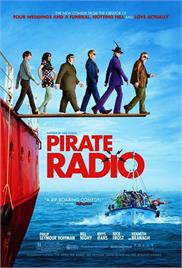Be Careful of Fake Websites. Always use HindiMovies.to domain & Join our Telegram Channel for Latest Updates.

Likes: 1
Views: 1.77K
“The Boat That Rocked” is an ensemble comedy in which the romance takes place between the young people of the ’60s and pop music. It’s about a band of rogue DJs that captivated Britain, playing the music that defined a generation and standing up to a government that wanted classical music, and nothing else, on the airwaves. The Count, a big, brash, American god of the airwaves; Quentin, the boss of Radio Rock — a pirate radio station in the middle of the North Sea that’s populated by an eclectic crew of rock and roll DJs; Gavin, the greatest DJ in Britain who has just returned from his drug tour of America to reclaim his rightful position; Dave, an ironic, intelligent and cruelly funny co-broadcaster; and a fearsome British government official out for blood against the drug takers and lawbreakers of a once-great nation.
Duration: 117 min
Released: 2009
IMDb Rating: 7.4/10 (100,923 Votes)
Stars: Philip Seymour Hoffman, Charlie Rowe, Michael Hadley, Lucy Fleming
Directors: Richard Curtis
Writers: Richard Curtis
Year: 2009
Also Known As: The Boat That Rocked
The Boat That Rocked (2009) is a unique and captivating British comedy-drama that beautifully captures the spirit and rebellion of the 1960s pirate radio era. Also known in some regions as Pirate Radio, this film offers an entertaining blend of humor, music, and heartfelt moments that underscore the cultural clash between youthful freedom and establishment control.
Directed by Richard Curtis, a filmmaker renowned for his heartwarming and witty movies such as Love Actually and Notting Hill, The Boat That Rocked stands out as a lively homage to the brutal crackdown on offshore radio stations by the British government. The screenplay benefits enormously from Curtis's keen eye for character-driven storytelling and his signature blend of comedy and sentimentality, weaving a narrative that is as much about camaraderie as it is about rock and roll.
Set in 1966, the plot centers on a rogue radio station broadcasting from a ship anchored in international waters to evade government censorship. This pirate radio ship, Radio Rock, is the heart of the story. It passionately plays rock and pop music at a time when such genres were largely banned from mainstream British airwaves. The movie explores the wild, carefree lives of the radio jockeys (DJs) who run the station and their ongoing battle against the government's attempts to shut them down.
The main characters onboard Radio Rock are brought to life by an ensemble cast of exceptionally talented actors. The film features the late Philip Seymour Hoffman as the charismatic and eccentric The Count, who is one of the station's leading DJs. Hoffman's performance adds a magnetic energy and a touch of melancholic wisdom to the film, demonstrating why he was considered one of the finest actors of his generation.
Joining Hoffman is Bill Nighy, who plays the suave and deadpan Quentin, the savvy station manager whose dry wit offers a counterbalance to the chaos onboard. Rhys Ifans delivers an energetic and loosely-calm portrayal of Gavin, one of the DJs, whose laid-back attitude perfectly embodies the rebellious youth culture of the sixties. Nick Frost brings his characteristic comedic flair as Simon, adding humor and heart to the ship's quirky family. Talulah Riley appears as Marianne, providing a fresh perspective as she becomes intertwined with the rock and roll world onboard.
The story also features a young Tom Sturridge as Carl, an innocent newcomer who finds himself swept into the Rock's vibrant, albeit chaotic environment. This character serves as the viewers’ entry point into the eccentric world of the pirate radio ship, making the experience more relatable and immersive.
The Boat That Rocked thrives on its lush soundtrack, which is a pivotal element that enriches the film's nostalgic aura. The soundtrack features iconic songs from legendary artists like The Rolling Stones, The Who, Led Zeppelin, and The Kinks — music that defined the decade and gave youth a new voice. The soundtrack is cleverly integrated into the narrative, highlighting the power that these forbidden sounds held and their role in challenging the status quo.
Though it is primarily categorized as a comedy, the film seamlessly weaves in dramatic elements that address serious themes such as freedom of expression, government censorship, and the generational divide. It captures the essence of an era when rock music was more than just entertainment; it was a form of rebellion and a catalyst for societal change.
From a technical standpoint, the cinematography brings the 1960s vividly to life, with vibrant colors and dynamic shots that give the audience a sense of the freedom of the open sea and the energetic atmosphere onboard the ship. The costume design and set decoration immerse viewers in the period, accurately reflecting the fashion and aesthetics of the time.
While the film received mixed reviews upon release, with some critics noting its loose structure and broad humor, it has since gained a loyal cult following. Audiences appreciate its affectionate portrayal of a vital chapter in music and broadcasting history, celebrating the spirit of youth, friendship, and rebellion.
In summary, The Boat That Rocked is a must-watch for lovers of music, history, and spirited comedy. It presents not only an entertaining story but also a tribute to the fearless individuals who risked it all to bring rock and roll to the airwaves. With Richard Curtis's deft direction, the powerhouse performances of Philip Seymour Hoffman, Bill Nighy, and the rest of the ensemble, and an unforgettable soundtrack, this film remains a vibrant reminder of a time when music was a revolution.